新目标人教版九年级unit1教案
人教版英语九年级全册Unit1 SectionA(3a-3b)名师教案

Unit1 SectionA〔3a-3c〕名师教案【教材版本与册数】新目标人教版九年级全一册【单元名称】Unit 1 How can we become good learners?【课时】Section A (3a-3b)〔第2课时〕【课型】Reading(阅读课〕【本课时教学设计】教材版本:新目标册数:第5册年级:九年级单元:Unit1 课型(课时):Section A 3a—3b 阅读课教材分析【本单元话题】围绕学习本身,讲述了学习的障碍及对应的解决方法,对学生有重要意义。
【本单元重点掌握目标】用“by + 动词-ing形式〞构造来表达方式方法。
【教材内容分析】阅读语篇在训练、开展学生阅读水平的同时,能帮助学生意识到提高学习兴趣和改良学习方法的重要性。
活动3A提出三个问题,帮助学生掌握文章主要内容;活动3b将两篇内容和本单元的重点语言构造“by +动词-ing 形式〞结合,对作者使用的英语学习的方法进展梳理。
【综合技能】通过阅读课文,培养好的学习方法,养成良好的学习习惯。
教学目标语言知识目标:1. Talk about how to study. 学会讨论各种学习方法2. Find out your suitable learning methods. 找出适合自己的学习方法。
3. 熟练掌握以下词汇:expression discover secret grammar4. 熟练掌握以下短语:look up connect…with… pay attention to fall in love the secret to…5. 掌握以下句型:How do you study English?I learn by working with a group.Do you learn English by reading aloud?How can I improve my pronunciation?情感态度价值观目标:1. 通过对学习方法的学习,培养学生用正确而科学的方法做事的能力,明白“一份耕耘,一份收获〞。
人教新目标版九年级英语全册全一册教案
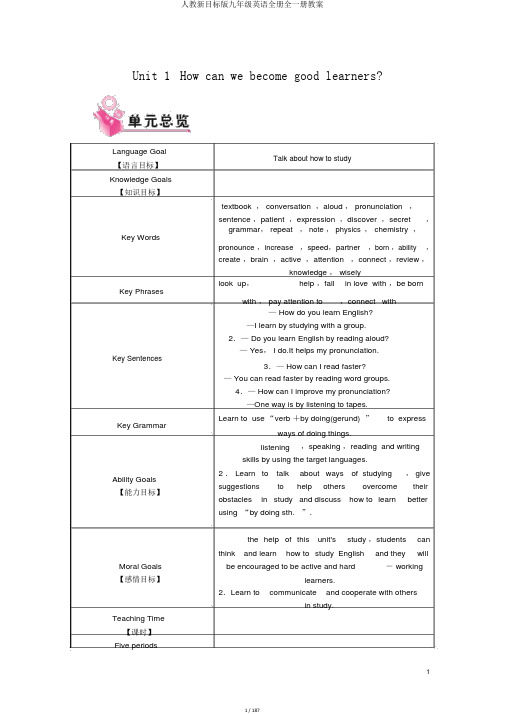
Unit 1 How can we become good learners?Language GoalTalk about how to study【语言目标】Knowledge Goals【知识目标】textbook , conversation ,aloud , pronunciation ,sentence ,patient ,expression ,discover ,secret ,grammar, repeat , note , physics , chemistry ,Key Words,speed,partner ,born ,ability ,pronounce ,increasecreate ,brain ,active ,attention ,connect ,review ,knowledge , wiselylook up,help ,fall in love with ,be born Key Phrases,connect withwith , pay attention to— How do you learn English?—I learn by studying with a group.2.— Do you learn English by reading aloud?— Yes, I do.It helps my pronunciation.Key Sentences3.— How can I read faster?— You can read faster by reading word groups.4.— How can I improve my pronunciation?—One way is by listening to tapes.Learn to use “verb +by doing(gerund) ”to express Key Grammarways of doing things.listening ,speaking ,reading and writingskills by using the target languages.Ability Goals 2 . Learn to talk about ways of studying , give suggestions to help others overcome their【能力目标】obstacles in study and discuss how to learn betterusing “by doing sth. ”.the help of this unit's study ,students canthink and learn how to study English and they will Moral Goals be encouraged to be active and hard - working 【感情目标】learners.2.Learn to communicate and cooperate with othersin study.Teaching Time【课时】Five periodsPeriod 1 Section A(1a - 2d)Period 2 Section A(3a - 4c)Period 3 Section B(1a - 1e)Period 4 Section B(2a - 2e)Period 5 Section B(3a - 3b) & Self Check本单元环绕学习的话题,叙述了学习的阻碍及对应的解决方法,对学生的学习有重要意义。
【5份】新目标人教版英语九年级unit1教学设计
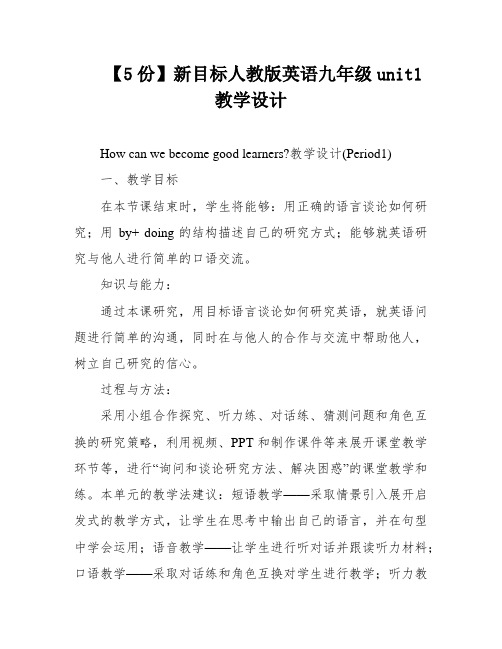
【5份】新目标人教版英语九年级unit1教学设计How can we become good learners?教学设计(Period1)一、教学目标在本节课结束时,学生将能够:用正确的语言谈论如何研究;用by+ doing的结构描述自己的研究方式;能够就英语研究与他人进行简单的口语交流。
知识与能力:通过本课研究,用目标语言谈论如何研究英语,就英语问题进行简单的沟通,同时在与他人的合作与交流中帮助他人,树立自己研究的信心。
过程与方法:采用小组合作探究、听力练、对话练、猜测问题和角色互换的研究策略,利用视频、PPT和制作课件等来展开课堂教学环节等,进行“询问和谈论研究方法、解决困惑”的课堂教学和练。
本单元的教学法建议:短语教学——采取情景引入展开启发式的教学方式,让学生在思考中输出自己的语言,并在句型中学会运用;语音教学——让学生进行听对话并跟读听力材料;口语教学——采取对话练和角色互换对学生进行教学;听力教学——采取听音配对、听音打钩和听音对应等的方式进行听力教学和听力技巧指导;口语教学——通过创设情境让学生进行对话练和角色互换活动,来进行语言的输出。
情感态度与价值观:经由进程参与课题教学活动,促进同学之间的了解和友谊,并在交流中了解英语研究的方法,建立研究英语的自信。
二、教学重难点教学重点:研究并掌握How do you study...? I study...by ....等相关句型和词汇。
研究并把握用by + doing结构表达方式方法。
教学难点:研究并用丰富的语言描述英语研究的方式和方法。
三、教学策略短语教学——采取视频引入话题然后进行启发式教学,并在对话中运用;语音教学——让学生跟读听力材料进行仿照式操练;口语教学——采取pair work和Role- play问答式的口语交际活动或小组活动互相操练;听力教学——采取采取听音配对、听音打钩和听音对应等方式语法教学——经由进程仿照听力材料进行对话练,在教师的纠正中培养精确的by + doing的结构意识。
新目标人教版九年级unit1教案
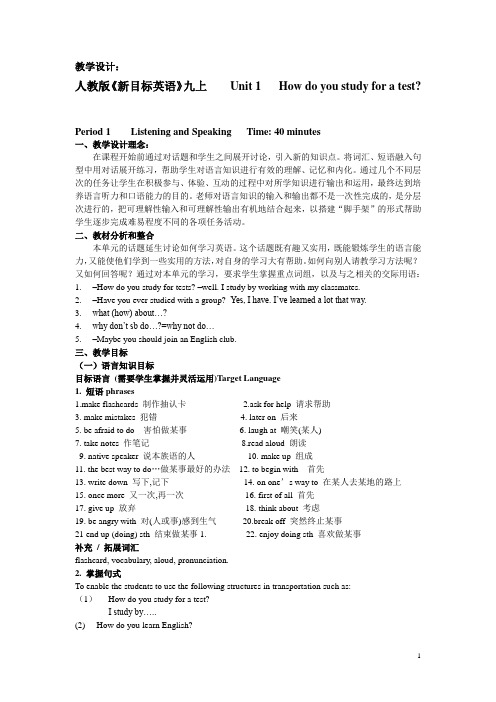
教学设计:人教版《新目标英语》九上Unit 1 How do you study for a test?Period 1 Listening and Speaking Time: 40 minutes一、教学设计理念:在课程开始前通过对话题和学生之间展开讨论,引入新的知识点。
将词汇、短语融入句型中用对话展开练习,帮助学生对语言知识进行有效的理解、记忆和内化。
通过几个不同层次的任务让学生在积极参与、体验、互动的过程中对所学知识进行输出和运用,最终达到培养语言听力和口语能力的目的。
老师对语言知识的输入和输出都不是一次性完成的,是分层次进行的,把可理解性输入和可理解性输出有机地结合起来,以搭建“脚手架”的形式帮助学生逐步完成难易程度不同的各项任务活动。
二、教材分析和整合本单元的话题延生讨论如何学习英语。
这个话题既有趣又实用,既能锻炼学生的语言能力,又能使他们学到一些实用的方法,对自身的学习大有帮助。
如何向别人请教学习方法呢?又如何回答呢?通过对本单元的学习,要求学生掌握重点词组,以及与之相关的交际用语:1. –How do you study for tests? –well. I study by working with my classmates.2. –Have you ever studied with a group?- Yes, I have. I’ve learned a lot that way.3. what (how) about…?4. why don’t sb do…?=why not do…5. –Maybe you should join an English club.三、教学目标(一)语言知识目标目标语言(需要学生掌握并灵活运用)Target Language1. 短语phrases1.make flashcards 制作抽认卡2.ask for help 请求帮助3. make mistakes 犯错4. later on 后来5. be afraid to do 害怕做某事6. laugh at 嘲笑(某人)7. take notes 作笔记8.read aloud 朗读9. native speaker 说本族语的人10. make up 组成11. the best way to do…做某事最好的办法12. to begin with 首先13. write down 写下,记下14. on one’s way to 在某人去某地的路上15. once more 又一次,再一次16. first of all 首先17. give up 放弃18. think about 考虑19. be angry with 对(人或事)感到生气20.break off 突然终止某事21 end up (doing) sth 结束做某事1. 22. enjoy doing sth 喜欢做某事补充/ 拓展词汇flashcard, vocabulary, aloud, pronunciation.2. 掌握句式To enable the students to use the following structures in transportation such as:(1)----How do you study for a test?----I study by…..(2)----How do you learn English?----I learn by….(3)----Do you learn English by…?----Yes, I do / No, I don’t.(4)----Have you ever studied with a group?----Yes, I have. I’ve learned a lot that way.(二)语言技能目标1.学会谈论如何学英语。
人教新目标版九年级英语Unit1Howcanwebecomegoodlearners教案1

HowcanwebecomegoodlearnersAnalysis oftheTea chingMat erial 【Curriculumrequirements】1.能够积极思考,小组讨论,理清写作思路。
2.能够准确使用所学习的词汇句子表达自己的思想。
AnalysisoftheTeachingMaterial:本节课紧紧围绕上节课所学知识,继续讨论同学们在学习中遇到的问题,并积极寻求解决办法,找到适合自己的学习方法,养成良好的学习习惯。
Teaching AimsandD emands KnowledgeObjects运用动名词就英语学习方法进行写作1、介绍自己或他人的英语学习经验;2、给他人提出英语学习建议;3、描述自己或他人在英语学习中的问题AbilityObjects能够运用v+ing清楚地表达学习中的问题与解决办法。
MoralObjects通过对学习方法的学习,培养学生用正确科学的方法做事的能力。
明白“一分耕耘,一分收获。
”Teaching KeyPoint s AndTeach ingDiffi TeachingKeyPoints运用动名词就英语学习方法进行写作1、介绍自己或他人的英语学习经验;2、给他人提出英语学习建议;3、描述自己或他人在英语学习中的问题Teachin如何使得写作的内容句式不太单一且能清楚Blackboa rdDesign bysurfingtheInternet. bymakingflashcards. byreadingthetextbook. byaskingtheteacherforhelp. bymakingvocabularylists. bytakingnotescarefully. byhavingtheEnglishclasscarefully. byfinishingmyhomeworkseriously.Homework 运用下面的形式写出你喜欢的学习方法,并给出适当的理由。
最新人教版新目标英语九年级英语初三全册Unit 1 优秀教学案(含答案)
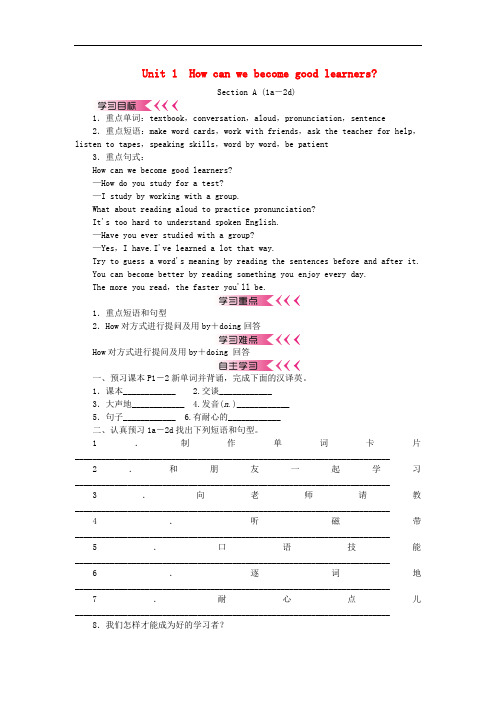
Unit 1 How can we become good learners?Section A (1a-2d)1.重点单词:textbook,conversation,aloud,pronunciation,sentence2.重点短语:make word cards,work with friends,ask the teacher for help,listen to tapes,speaking skills,word by word,be patient3.重点句式:How can we become good learners?—How do you study for a test?—I study by working with a group.What about reading aloud to practice pronunciation?It's too hard to understand spoken English.—Have you ever studied with a group?—Yes,I have.I've learned a lot that way.Try to guess a word's meaning by reading the sentences before and after it.You can become better by reading something you enjoy every day.The more you read,the faster you'll be.1.重点短语和句型2.How对方式进行提问及用by+doing回答How对方式进行提问及用by+doing 回答一、预习课本P1-2新单词并背诵,完成下面的汉译英。
1.课本____________ 2.交谈____________3.大声地____________ 4.发音(n.)____________5.句子____________ 6.有耐心的____________二、认真预习1a-2d找出下列短语和句型。
人教版新目标九年级英语Unit1单元教案
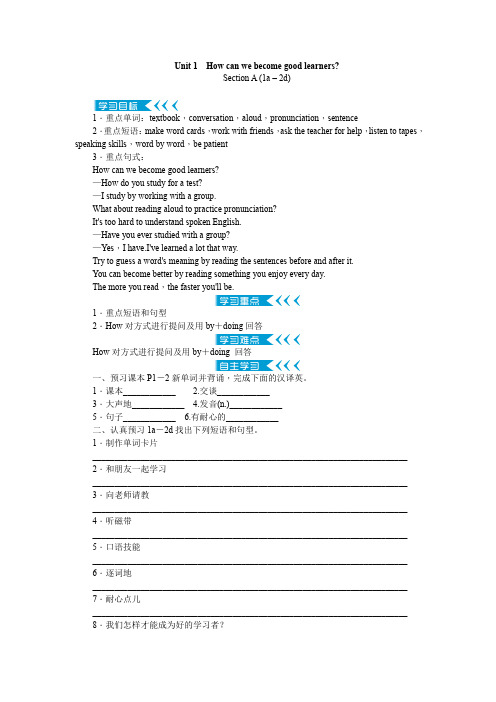
Unit 1How can we become good learners?Section A (1a-2d)1.重点单词:textbook,conversation,aloud,pronunciation,sentence2.重点短语:make word cards,work with friends,ask the teacher for help,listen to tapes,speaking skills,word by word,be patient3.重点句式:How can we become good learners?—How do you study for a test?—I study by working with a group.What about reading aloud to practice pronunciation?It's too hard to understand spoken English.—Have you ever studied with a group?—Yes,I have.I've learned a lot that way.Try to guess a word's meaning by reading the sentences before and after it.You can become better by reading something you enjoy every day.The more you read,the faster you'll be.1.重点短语和句型2.How对方式进行提问及用by+doing回答How对方式进行提问及用by+doing 回答一、预习课本P1-2新单词并背诵,完成下面的汉译英。
1.课本____________ 2.交谈____________3.大声地____________ 4.发音(n.)____________5.句子____________ 6.有耐心的____________二、认真预习1a-2d找出下列短语和句型。
人教版英语九年级全一册教案:Unit1SectionA(4a-4c)
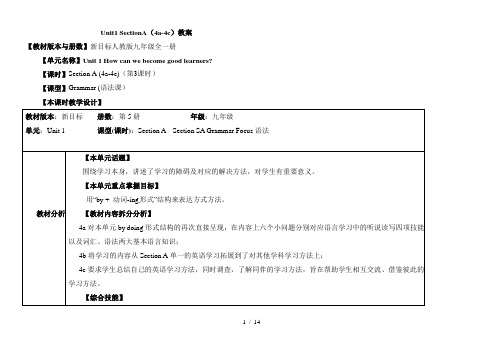
Unit1 SectionA(4a-4c)教案【教材版本与册数】新目标人教版九年级全一册【单元名称】Unit 1 How can we become good learners?【课时】Section A (4a-4c)(第3课时)【课型】Grammar (语法课)【本课时教学设计】教材版本:新目标册数:第5册年级:九年级单元:Unit 1 课型(课时):Section A Section SA Grammar Focus语法教材分析【本单元话题】围绕学习本身,讲述了学习的障碍及对应的解决方法,对学生有重要意义。
【本单元重点掌握目标】用“by + 动词-ing形式”结构来表达方式方法。
【教材内容拆分分析】4a对本单元by doing形式结构的再次直接呈现,在内容上六个小问题分别对应语言学习中的听说读写四项技能以及词汇、语法两大基本语言知识;4b将学习的内容从Section A单一的英语学习拓展到了对其他学科学习方法上;4c要求学生总结自己的英语学习方法,同时调查,了解同伴的学习方法,旨在帮助学生相互交流、借鉴彼此的学习方法。
【综合技能】1 / 142 / 14附:教学活动设计3 / 14/physics/chemistry?Do you learn history and geographyby________?学习兴趣DE LC5 2 获Step2Pre-Task(5 mins)Step 3While-TFind the new words and phrases重复,重做________物理__________化学___________记忆,记住________练习做某事_____________做笔记______句子模式_____________Answers:重复,重做----repeat物理___physics化学---chemistry记忆,记住---memorize练习做某事---practice doing sth做笔记---- take notes句子模式----sentence patterns为本节课语法任务的完成扫除障碍。
人教版新目标英语九年级Unit1教案

人教版新目标英语九年级Unit1教案Listen again and match each question from 2a with an answer in the box on page 3.2c Doing a pairworkNext we are going to make a conversation in pairs using the information from activities 2a and 2b.A: Have you ever studied with a group?B: Yes, I have. I’ve learned a lot that way.A: Have you ever learned English by watching videos?B: Yes, I have. I’ve learned a lot that way.A: Have you ever practiced conversations with friends?B: Yes, I have. I’ve learned a lot that way.A: Have you ever listened to tapes?B: Yes, I have. I’ve learned a lot that way.A: Have you ever read aloud to practice pronunciation?B: Yes, I have. I’ve learned a lot that way.3a Reading the article and completing the chart1.Reading to the tapeWe are going to read the article on page 4. First we shall read to the tape together. That is, we start reading aloud as the recorder goes, and we stop reading aloud as the recorder stops. While reading, let’s pay enough a ttention to the pauses, the pronunciation and the intonation of the native reader. Make our reading aloud as the same as the reader’s.2.Reading and dividing the article into partsNext we are going to read aloud the article slowly and clearly. We will try to divide it into thought groups.3.Reading and underliningWe shall read the article once again, this time, to underline all the useful expressions in it. After school, you are going to write them down in your notebook.4.Translating and completing the chartBecause you have read this article many times you are going to translate it into Chinese first and then complete the chart on page 4.Who will be the first to have a try?Ways of learning EnglishNot successful OK SuccessfulLillian Li Studyinggrammar memorizing thewords of popsongsreading EnglishmagazinesWei Ming watching movies watching Englishmoviesstudying grammarLiu Chang havingconversations/with friends joining the English clubSilence, please! We are going to have a role play in pairs. One of the pair is to be one of the people in 3a. The other is to interview him or her about learning English.Zhao: Excuse me, Li Hong. Could you help me with my English?Li: Yes, please. What’s the matter?Zhao: I have difficulty studying grammar.Li: Grammar? I never studying grammar. I study English mostly by memorizingthe words of pop songs.Zhao: No grammar at all?Li: Yes, I did study grammar. But I study it by reading English magazines. I putgrammar learning into reading articles. That is the best way to understandEnglish grammar.Turn to page 4 to check √what you do to learn English in the box.Closing down by asking and answering—How did you learn English?*I listened to English them every day.*I read English books many times a day.*I learned many English songs by heart.*I sang the English songs to myself.*I learned every new English word in the text.*I learn English by going to English classes.*I do English homework at school.*I read English textbooks in the evening.*I speak English very slowly.*I play computer games in English.*I read a lot of English sentences in the morning.*I do well in class English tests.*I get a lot of good advice on learning English from my teacher.*I discuss English problems with my classmates.*I follow the advice from my father.*I learn English sounds from the tape.*I use English-English dictionaries.*I listen to recordings and English-language TV.*I talk to native speakers every chance I got.*I read books in English, mostly novels.*I learn a lot of new words from English books.*I write more and more e-mail in English.*I use English more than my first language.*Most of my reading (websites and books) is in English.Section BGoals●To listen about learning English●To talk about learning English●To read about learning EnglishProceduresWarming up by reading to the recordingHello, everyone. To begin with, let’s listen and read to the recording of the text HOW DO YOU LEARN BEST? That is, read aloud to the tape, as fast as the tape goes, as clearly as the native reader reads. OK? Here we go!My cat speaks English.Sometimes my cat comes to me and tells me that she is hungry. Or that her leg hurts. How does my cat tell me these things? I don't speak pussy-cat language.1a Reading and checkingLearning English can be both easy and difficult. What things are easy for you? And what things are difficult for you? Now turn to page 5, read the list on the top and check √the statements that are true for you.1b Making a listYou have read and checked the statements true for you. Now think and make a list of other things difficult for you, too.I don’t know how to…!1. I don’t know how to use commas.2. I don’t know how to work with others.3. I don’t know how to mak e flashcards.4. I don’t know how to read the textbook.5. I don’t know how to make vocabulary lists.6. I do n’t know how to listen to tape.7. I don’t know how to ask the teacher for help.8. I don’t know how to study for a test.9. I don’t know how to work with a group.10. I don’t know how to watch English videos.11. I don’t know how to practice conversa tions with friends.12. I don’t know how to read aloud to practice pronunciation.13. I don’t know how to learn by using English.14. I don’t know how to get more specific suggestions.15. I don’t know how to read English magazines.16. I don’t know how to learn new words.17. I don’t know how to memorize the words.18. I don’t know how to studying grammar19. I don’t know how to watching English movies20. I don’t know how to joining the English club21. I don’t know how to improve her English22. I don’t know how to get lots of practice13. I don’t know how to ask teachers about the best ways to learn more English.2a Listening and checkingPaul is a nice boy. He works hard at his English, but still has many learning challenges. Now listen to find out what challenges he has and check them in the box on page 5.2b Listening and matchingNow listen again to Paul talking about his challenges at learning English and match them with the solutions listed in the box on page 5. While listening, pay attention to the structures of the sentences.2c Doing pairworkIN pairs we are going to role play conversations using the information from activities 2a and 2b.I don’t have a partner to practiceMaybe you should join an English language club. English with.I can’t get the pronunciation right.Listening can help.I forget a lot of new words. Write the new words on cards and study them daily.I can’t understand when people talk to me. You can join an English club to talk to people more in English.I can’t understand the words inmagazines.You can look them up in a dictionary.I don’t get much writing practices.Start writing an English diary every day.I read very slowly. You should read to the recording of the text.I make mistakes in grammar. Why d on’t study the basic sentence patterns3a Reading and cuttingIt’s time to read the text HOW I LEARN ENGLISH. Now read and check (/) the senten ces.We are going to read the text again to study the form and function of all the predicate verbs. Next we shall read the text for the third time to underline all the useful expressions. After class you are to copy them into your notebook.All right, read the text the fourth time and circle all the signal words, or the linking words which connect all the short sentences.Now you may read the statements in the box on page 6 following the text. Write “T” or “F” beside each statement.3b Writing a letterYour friend Lin Feng is having difficulties with her English. Write her a letter telling her how to become a better English learner.Dear Lin Feng,I know it isn’t easy to learn English, but I have some ideas that may help. You said you couldn’t understand people who talked fast. Well, you can try to listen for the most important words, not every word. It is difficu lt to understand by listening what you have not read or what you can’t understand well by reading. To listen well you have to read well. So keep on reading English. Listening and reading to the recording of the text is very important, too. Every text, after being read, should be listened to and read aloud to the tape. At first you may find it difficult to follow the reader reading aloud the text. Don’t worry. If you keep practicing you will be able to read aloud as fast as the native reader from the tape. And then you can understand people who talk fast in English.Yours,Tai ZuoYou have been learning English for at least three years. That is such a long time. Now think about the things that have helped you the most in learning English. Write an article telling others about them.4 Doing an interviewNext we shall do an interview in groups of four. Ask the three group mates about learning English. Take notes of what they say. Tomorrow you shall stand to tell the class about theirQ. What isn’t easy about learning English? A. Reading is not easy.Q. What do you do about this? A. I try to cut the sentences into thoughtgroups.Q. What is your favorite way to learn more English? I read and read aloud a lot. These are the best way.SELF CHECK1.Filling in the blankWe shall make a check on our use of expressions first. Turn to page 7 and fill in each blank with the correct word given. Change the form of the word if necessary. Then make your own sentences with each word.Complete the sentences Make your sentences1. You should write down new English wordsin a vocabulary list.Don’t trust your memory. Write it down.2. If you don’t know how to spell new words,look them up in a dictionary.I don’t know how to spell your name.3. The best way to improve your English is tojoin an English club.I’d like to join the school football tea.4. Another thing that he find very difficult wasEnglish grammar.I find it easy to learn English.5. This kind of paper feels very soft. Do you feel cold?2.Writing an articleTurn to page 7 and write an article about Xu Zheng using the notes on Xu and his essay.Xu Zheng: a boy fond of EnglishMost people in the world speak English as a second language. And so does Xu Zheng. Yesterday I asked Xu Zheng about his ways to learn English. He said he learns by making up conversations and speaking to friends in English. When I asked about studying pronunciation, he said he spent much time on it, but he still found native speakers’ pronunciation difficult to learn.I said to him, “You are a computer student. Why are you so interested in English?”“English popular in science. And it is popular around the world for computers,” he told me. “I like writing notes, watching movies and listening to pop songs. But I like reading in English online most, ” added he.Xu Zheng is right. English can really help us understand many new things from other countries. Let’s learn from Xu Zheng. Let’s be fond of English, too.IReading: How do we deal with our problems?As English is learned mostly through reading in China, we shall now turn to page 8 to learn to read the article entitled: How do we deal with our problem?Before reading, please go over the vocabulary list for reading on page 146. Get yourself familiarized with all the words and expressions to be found in the article.While reading try to divide the sentences into thought groups and underline all the expressions useful to you. While you are reading it for the second time, try to circle all the linking words and try translating the text into Chinese.After reading, copy the underlined expressions into your Phrase Book as home.Expressions from How do we deal with our problem?rich or poor, young or old, have problems, deal with one’s problems, become unhappy, worry about one’s problems, do well at school, influence the way, behave well with…, deal with one’s problems, be angry with…, feel unfair, stay angry for years about…, t ime goes by, lose goodfriendships, see…playing together, have disagreements, talk to each other, last for long, an important lesson for…,solve a problem by learning to forget, regarding problems as challenges, complain about school, have too much work to do, the rules are too strict, change…into…, an important part of one’]s development, as young adults, be one’s duty, to try one’s best, to deal with…in one’s education, with the help of…, thinking of something worse, comparing…to…,find one’s problems, think about…, for example, a very clever scientist, regards…as unimportant, become very famous and successful, worry about…, face the challenges。
人教版新目标英语九年级Unit 1 单元话题写作教学案
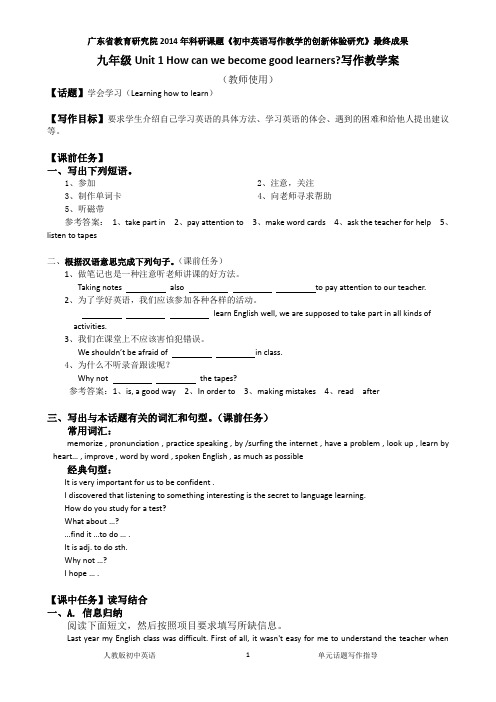
九年级Unit 1 How can we become good learners?写作教学案(教师使用)【话题】学会学习(Learning how to learn)【写作目标】要求学生介绍自己学习英语的具体方法、学习英语的体会、遇到的困难和给他人提出建议等。
【课前任务】一、写出下列短语。
1、参加2、注意,关注3、制作单词卡4、向老师寻求帮助5、听磁带参考答案:1、take part in 2、pay attention to 3、make word cards 4、ask the teacher for help 5、listen to tapes二、根据汉语意思完成下列句子。
(课前任务)1、做笔记也是一种注意听老师讲课的好方法。
Taking notes also to pay attention to our teacher.2、为了学好英语,我们应该参加各种各样的活动。
learn English well, we are supposed to take part in all kinds of activities.3、我们在课堂上不应该害怕犯错误。
We shouldn’t be afraid of in class.4、为什么不听录音跟读呢?Why not the tapes?参考答案:1、is, a good way 2、In order to 3、making mistakes 4、read after三、写出与本话题有关的词汇和句型。
(课前任务)常用词汇:memorize , pronunciation , practice speaking , by /surfing the internet , have a problem , look up , learn by heart… ,improve , word by word , spoken English , as much as possible经典句型:It is very important for us to be confident .I discovered that listening to something interesting is the secret to language learning.How do you study for a test?Wha t about …?…find it …to do … .It is adj. to do sth.Why not …?I hope … .【课中任务】读写结合一、A. 信息归纳阅读下面短文,然后按照项目要求填写所缺信息。
新目标九年级英语Unit1教案
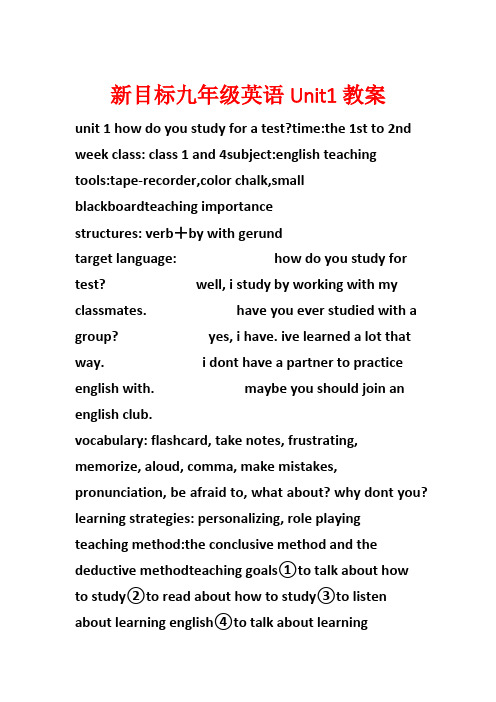
新目标九年级英语Unit1教案unit 1 how do you study for a test?time:the 1st to 2nd week class: class 1 and 4subject:english teaching tools:tape-recorder,color chalk,small blackboardteaching importancestructures: verb+by with gerundtarget language: how do you study for test? well, i study by working with my classmates. have you ever studied with a group? yes, i have. ive learned a lot that way. i dont have a partner to practice english with. maybe you should join an english club.vocabulary: flashcard, take notes, frustrating, memorize, aloud, comma, make mistakes, pronunciation, be afraid to, what about? why dont you? learning strategies: personalizing, role playing teaching method:the conclusive method and the deductive methodteaching goals①to talk about howto study②to read about how to study③to listen about learning english④to talk about learningenglish⑤to read about learning englishsection agoals● to talk about how to study● to read about how to studyprocedures 1、warming up by greetinghello, everyone! from now on you are a ninth grader. congratulations to you and i wish you a great success in your studies!today we shall take up the first unit in this new term, unit 1 how do you study for a test?look at the blackboard and read after me the target language for this unit. when you read pay attention to the structure of the sentence.▲how do you study for test? ▼well, i study by working with my classmates.▲have you ever studied with a group?▼yes, i have. ive learned a lot that way.▲i dont have a partner to practice english with.▼maybe you should join an english club.learning to learn is very important. and learning to pass a test is also very important to you. learning couldnt be easier!if you have not developed good ways or methods to study for a test, talk to your classmates about it, your parents, or the teacher like me if you are brave enough. you should be brave enough to talk to others about your problems with your studies. next idlike to give you some useful practical advice about studying for a test and also ask you questions to make you think about things such as:▲using your time effectively ▲motivation ▲how to learn your lessons in the ninth grade year ▲different modes of teaching you may meet ▲how to develop particular skills, such as note-taking in class 1a: checking the ways you studynext turn to page 2 and check radic; the ways you study for an english test. then add other ways you use sometimes.how do you study for a test?i study for a test___ by reading to the tape; by underlining the expressions; by reading beyond the text; by doing used exam papers; by going over exercises books; by copying down the text; by learning the text by heart; by speaking with classmates now raise your hand and report your added ways to the class. i will make a list of all the added ways on the blackboard.1b listening and writinglisten to understand how these people in the picture on page 2 study for a test. write letters from the pictures. while listening, pay attention to the structures of the sentences. section a 1b tapescript boy1:hey, gang.theres a big test on tuesday. i really need some help. can you tell me how you study for a big test? voices: sure! yes. sure we will. boy1: you did really well on the last english test, didnt you, mei? girl1: yeah, i did ok. boy1: well, how did you study?girl1:by making flashcards. boy1: maybe ill try that. how did you study, pierre? boy2: by asking the teacher for help. she was really happy i asked.boy1: thats interesting. how do you study, antonio? boy3: i like to study by listening to cassettes. but sometimes my mother thinks im listening to music. and then she gets mad.boy1:oh, well 1c doing a pairworknow in pairs ask your partner how he or she studies for a test.a: how do you study for a test?b: i study by working with a group.c: i study by listening to english.d. i study by playing games with my classmates.e. i study by doing actions such as coloring, matching.f. i study by singing english songs.g. i study by writing letters and emails.h. i study by acting out simple dialogues.i. i study by listening to and understanding stories.j. i study by writing simple sentences.k. i study by imitating from the recording.l. i study by speaking out words or phrases.m. i study by doing simple role plays.n. i study by reading and understanding simple stories. o. i study by using daily expressions.p. i study by performing short plays.q. i study by performing simple rhymes.r. i study by writing sentences for pictures.s. i study by writing out simple poems.t. i study by reading aloud correctly.u. i study by playing text plays.v. i study by working with classmates.w. i study by going over the text before class.x. i study by copying words and expressions.y. i study by looking and saying.z. i study by asking others questions.2a listening and checkingnow lets go to page 3. listen to the tape and check the questions you ask.while listening, pay attention to the structures of thesentences.section a 2a, 2b tapescript girl1:welcome to the english club. today were going to talk about the best ways to learn english. who has an idea?boy1: do you learn english by watchingenglish-language videos? girl2: no. its too hard to understand the voices. boy1: what about keeping a diary in english? do you learn english that way? girl2:i think so. it helps to write english every day. girl3: have you ever studied with a group? girl2:yes, i have! ive learned a lot that way. girl1: do you ever practice conversations with a friend?girl2:oh, yes. it improves my speaking skills.boy1: what about reading aloud to practice pronunciation? girl3: i do that sometimes.i think it helps. boy2: i do too. and i always look up new words in a dictionary.girl3:thats a great idea! 2b listening and matchinglisten again and match each question from 2a with an answer in the box on page 3.2c doing a pairworknext we are going to make aconversation in pairs using the information from activities 2a and 2b.a: have you ever studied with a group? b: yes, i have. ive learned a lot that way.a: have you ever learned english by watching videos? b: yes, i have. ive learned a lot that way.a: have you ever practiced conversations with friends? b: yes, i have. ive learned a lot that way.a: have you ever listened to tapes? b: yes, i have. ive learned a lot that way.a: have you ever read aloud to practice pronunciation? b: yes, i have. ive learned a lot that way.3a reading the article and completing thechart1.reading to the tapewe are going to read the article on page 4. first we shall read to the tape together. that is, we start reading aloud as the recorder goes, and we stop reading aloud as the recorder stops. while reading, lets pay enough attention to the pauses, the pronunciation and the intonation of the native reader. make our reading aloud as the same as the readers.2.reading and dividing the article into partsnext we are going to read aloud the article slowlyand clearly. we will try to divide it into thought groups.3.reading and underliningwe shall read the article once again, this time, to underline all the useful expressions in it. after school, you are going to write them down in your notebook.this week/ we asked students/ at new star high school/ about the best ways/ to learn more english. many said/ they learnt/ by using english. some students had more specific suggestions. lillian li, for example, said/ the best way/ to learn new words/ was by reading english magazines. she said that/ memorizing the words of pop songs/ also helped/ a little. when we asked about studying grammar/ she said, i never study grammar.it's too boring. wei ming feels differently. he's been learning english/ for six years/ and really loves it. he thinks/ studying grammar /is a great way/ to learn a language. he also thinks that/ watching english movies/ isn't a bad way/ because he can watch the actors/ say the words. sometimes, however, he finds watching movies/ frustrating/ because the people speak too quickly. lin chang said that/ joining the english club/ at school/ was the best way/to improve her english. students get lots of practice/ and they also have fun. she added that/ having conversations/ with friends/ was not helpful/ at all. we get excited/ about something/ and then/ end up speaking/ in chinese, she said.4.translating and completing the chartbecause you have read this article many times you are going to translate it into chinese first and then complete the chart on page 4.who will be the first to have a try? ways of learning englishnot successfuloksuccessfullillian listudying grammarmemorizing the words of pop songsreading english magazineswei mingwatching movieswatching english moviesstudying grammarliu changhaving conversations/ with friendsjoining the english club3b doing a pairworksilence, please! we are going to have a role play in pairs. one of the pair is to be one of the people in 3a. the other is to interview him or her about learning english.zhao: excuse me, li hong. could you help me with my english? li: yes, please. whats the matter? zhao: i have difficulty studying grammar.li: grammar? i never studying grammar. i study english mostly by memorizing the words of pop songs.zhao: no grammar at all? li: yes, i did study grammar. but i study it by reading english magazines. i put grammar learning into reading articles. that is the best way to understand english grammar.4 doing a pairworkturn to page 4 to check radic;what you do to learn english in the box. closing down by asking and answeringhow did you learn english?*i listened to english them every day. *i read english books many times a day.*i learned many english songs by heart. *i sang the english songs to myself. *i learned every new english word in the text.*i learn english by going to english classes. *i doenglish homework at school.*i read english textbooks in the evening. *i speak english very slowly. *i play computer games in english.*i read a lot of english sentences in the morning.*i do wellin class english tests. *i get a lot of good advice on learning english from my teacher.*i discuss english problems with my classmates. *i follow the advice from my father. *i learn english sounds from the tape.*i use english-english dictionaries. *i listento recordings and english-language tv.*i talk to native speakers every chance i got. *i read books in english, mostly novels. *i learn a lot of new words from english books. *i write more and more e-mail in english. *i use english more than my first language. *most of my reading (websites and books) is in english.homework句型转换1. he s learned 1010 words already.(否认句)2.they ve see the film many times.(一般疑问句)3.we ve finished our work on time.(就划线局部提问)4. i speak english so well by practicing.(就划线局部提问)5 .has tom done the homework yet ? (否认答复)additional exercises:to translate the following sentences into english1、保罗没有进展较多的笔头练习。
新目标九年级英语第一单元说课稿
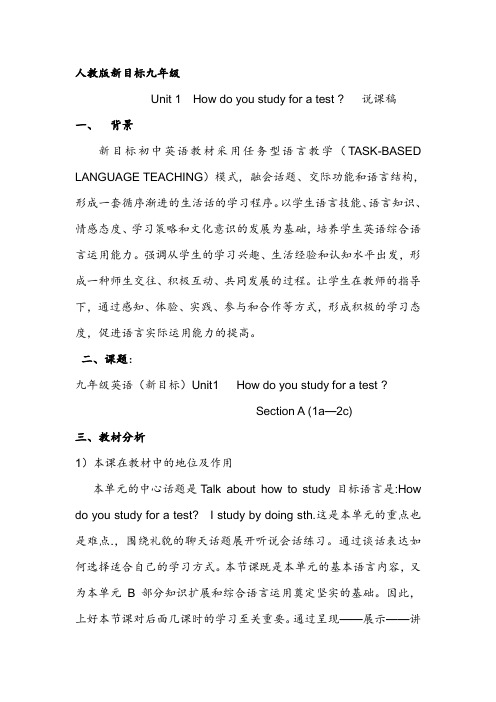
人教版新目标九年级Unit 1 How do you study for a test ? 说课稿一、背景新目标初中英语教材采用任务型语言教学(TASK-BASED LANGUAGE TEACHING)模式,融会话题、交际功能和语言结构,形成一套循序渐进的生活话的学习程序。
以学生语言技能、语言知识、情感态度、学习策略和文化意识的发展为基础,培养学生英语综合语言运用能力。
强调从学生的学习兴趣、生活经验和认知水平出发,形成一种师生交往、积极互动、共同发展的过程。
让学生在教师的指导下,通过感知、体验、实践、参与和合作等方式,形成积极的学习态度,促进语言实际运用能力的提高。
二、课题:九年级英语(新目标)Unit1 How do you study for a test ?Section A (1a—2c)三、教材分析1)本课在教材中的地位及作用本单元的中心话题是Talk about how to study 目标语言是:How do you study for a test? I study by doing sth.这是本单元的重点也是难点.,围绕礼貌的聊天话题展开听说会话练习。
通过谈话表达如何选择适合自己的学习方式。
本节课既是本单元的基本语言内容,又为本单元B部分知识扩展和综合语言运用奠定坚实的基础。
因此,上好本节课对后面几课时的学习至关重要。
通过呈现——展示——讲解——理解——操练——运用这几个环节,循序渐进地描述学习方法,灵活地运用句型。
2)教学目标: 1.Master the key words and phrases.2.Learn to talk about how to study……? .3.Learn to make use of “You can do sth/I study by doing sth?3)教学重难点:1.Words and expressions in this unit .2. How to make conversations freely using the target language.3.Master the usage of key sentences structure.4)情感目标: 1.Encourage student to communicate with others about study ways .2. Enjoy helping sb who is in difficult and giving advice5)教学准备:teaching cards , pictures , a tape recorder四、教学方法用计算机辅助教学,以任务型教学法为主体,以小组活动,两人协作为依托。
人教版新目标九年级英语全套教案
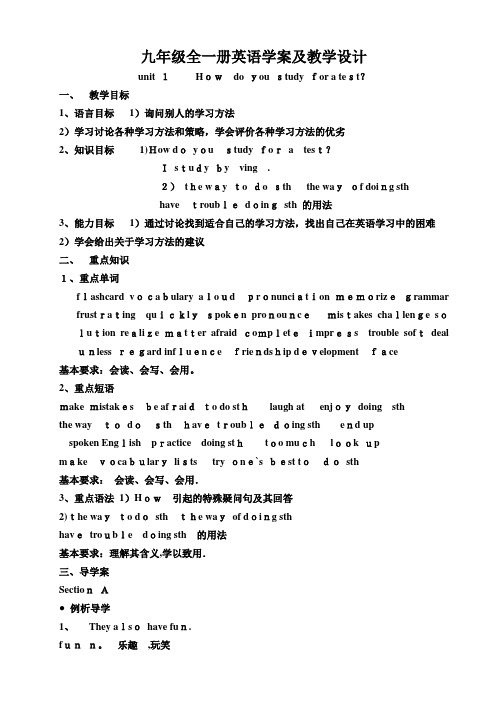
九年级全一册英语学案及教学设计unit 1Howdo you study for a test?一、教学目标1、语言目标1)询问别人的学习方法2)学习讨论各种学习方法和策略,学会评价各种学习方法的优劣2、知识目标1)How doyoustudy fora test?Istudy by ving.2)the way to do sth the wayof doing sthhavetroubledoingsth 的用法3、能力目标1)通过讨论找到适合自己的学习方法,找出自己在英语学习中的困难2)学会给出关于学习方法的建议二、重点知识1、重点单词flashcard vocabulary aloudpronunciation memorizegrammar frustrating quicklyspoken pronouncemistakes challenge solution realize matter afraid completeimpress trouble softdeal unless regard influencefriendship developmentface基本要求:会读、会写、会用。
2、重点短语make mistakes be afraidto do sthlaugh at enjoydoing sththe waytodosth havetroubledoing sth end up spoken English practice doing sthtoo much look upmakevocabularylists try one`s best todosth基本要求:会读、会写、会用.3、重点语法1)How引起的特殊疑问句及其回答2)the wayto dosth the wayof doing sthhavetrouble doing sth 的用法基本要求:理解其含义,学以致用.三、导学案SectionA● 例析导学1、They alsohave fun.funn。
新目标九年级英语Unit1教案

新目标九年级英语Unit1教案一、教学目标通过本单元的学习,学生能够掌握以下英语知识和技能:1.学习并掌握本单元的重点词汇和短语。
2.能够运用所学的句型和词汇进行基本的英语对话。
3.能够听懂并理解有关学校生活和课程的简单对话和文章。
4.能够正确运用所学的语法知识,进行句子的构建和转换。
二、重点和难点本单元的重点是学习并掌握本单元的重点词汇和短语,以及能够正确运用所学的语法知识。
难点是能够听懂有关学校生活和课程的简单对话和文章。
三、教学准备1.教材:新目标九年级英语教材Unit1。
2.教具:投影仪、音频设备。
四、教学过程Step 1:导入新课通过向学生展示一张图片或提出一个与本单元主题相关的问题来引起学生的兴趣。
例如,可以展示一张学校的图片,然后向学生提问:“How do you like your school?” 学生可以就这个问题进行小组讨论。
Step 2:学习词汇和短语通过播放录音和展示词汇图片的方式教授本单元的重点词汇和短语。
老师可以先逐个朗读单词和短语,然后引导学生跟读。
接着,老师可以播放录音,让学生通过听音标出所学的词汇和短语。
Step 3:听力训练播放录音,让学生听一个短对话,并回答与对话内容相关的问题。
然后,老师可以和学生一起核对答案。
接下来,再播放录音,让学生听一篇短文,并回答一些与短文内容相关的问题。
Step 4:口语训练让学生分组进行对话练习。
老师可以给每个小组一个话题,然后让他们用英语进行对话。
例如,可以让学生用英语描述一个他们喜欢的老师或课程。
Step 5:语法讲解通过示范和解释的方式教授所学的语法知识点。
例如,可以讲解现在进行时的构造和用法。
教师可以先给学生一些例句,然后解释句子的结构和含义。
Step 6:语法练习给学生一些练习题,让他们运用所学的语法知识进行句子的构建和转换。
例如,可以让学生根据给定的动词和人称代词,完成句子的构建和转换。
Step 7:阅读训练让学生阅读一篇有关学校生活和课程的短文,并回答问题。
九年级英语 全册教案 人教新目标版
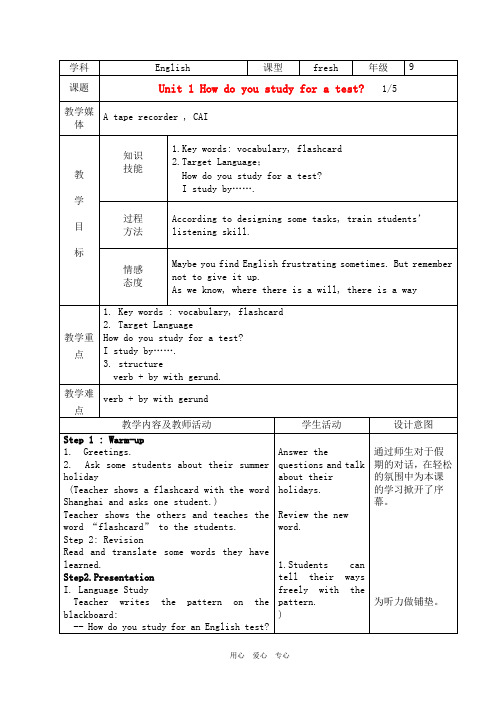
教学难点
verb + by with gerund
教学内容及教师活动
学生活动
设计意图
Step 1 : Warm-up
1. Greetings.
2. Ask some students about their summer holiday
(Teacher shows a flashcard with the word Shanghai and asks one student.)
3. Read the sample answer to the class and ask students to say the other two.
Step3 Consolidation and extension
1. Read the instructions and the conversation to the class, and then ask students to make similar conversations.
Check the answers with the whole class
II. 2b
This activity provides listening practice using the target language.
Point to the list of answers in the box.
Get different students to read the answers to the class.
Point to the checked questions in Activity2a.
Play the recording
九年级英语全册Unit1sectionA_1教案设计新版人教新目标版
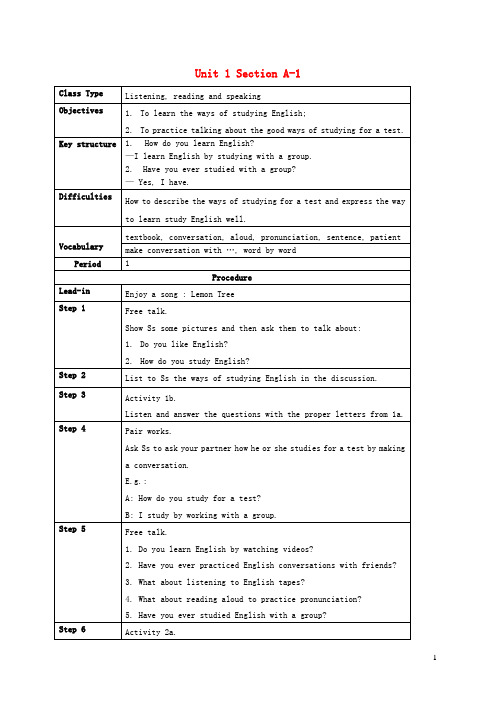
4. What about reading aloud to practice pronunciation?
5. Have you ever studied English with a group?
Step6
Activity2a.
E.g.:
A: How do you study for a test?
B: I study by working with a group.
Step 5
Free talk.
1.Do you learn English by watching videos?
2.Have you ever practicedEnglish conversations with friends?
E.g.:
A: Have you ever studied with a group?
B: Yes, I have. I’ve learned a lot that way.
Step9
Let Ss enjoy a video about how to learn English.
Step10
Activity 2d.
Vocabulary
textbook, conversation, aloud, pronunciation, sentence, patient
makeconversation with…, word by word
Period
1
Procedure
Lead-in
Enjoy a song : Lemon Tree
Let Ss read the conversationbetween Jack and Annie and answer the quest1. Do you have good ways to learn English?
人教版新目标九年级英语Unit1单元集体备课教案
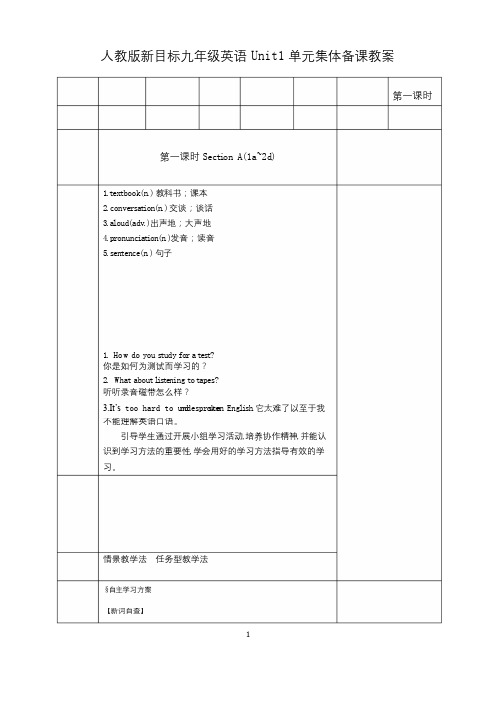
人教版新目标九年级英语Unit1单元集体备课教案第一课时第一课时Sect i on A(1a~2d)1.tex tbook(n.)教科书;课本2.conversa t ion(n.)交谈;谈话3.a loud(adv.)出声地;大声地4.pronunc ia t ion(n.)发音;读音5.sen tence(n.)句子1. How do you s tudy fo r a t e s t?你是如何为测试而学习的?2.What abou t l i s t e ning to t apes?听听录音磁带怎么样?3.It’s too hard to u n n d de sp r o s k t e a n Engl i sh.它太难了以至于我不能理解英语口语。
引导学生通过开展小组学习活动,培养协作精神,并能认识到学习方法的重要性,学会用好的学习方法指导有效的学习。
情景教学法任务型教学法§自主学习方案【新词自查】1根据句意及汉语提示完成句子。
1.We s tudy by read ing a loud(大声地).2.My fa ther had a long conversa t ion(交谈)wi th me about my s tudy yes te rday.5.Our headmas te r wi l l g ive a repor t(作报告)on how to become goodl ea rners th i s a f te rnoon.Teacher: Engl i sh i s a l iv ing language.I t i s wide ly used a l l over the wor ld.I ti s no t easy to l ea rn Engl i sh wel l fo r us because we don’t have a goodcondi t ion and our t ime i s too l imi ted. But where the re i s a wi l l,the r e i sa way.I f we keep on s peaking and us ing i t,we can lea rn i t we l l. Ques t ions:环节说明:通过课前的一个师生问答互动引入新课的话题。
新目标九年级英语unit1优秀教案
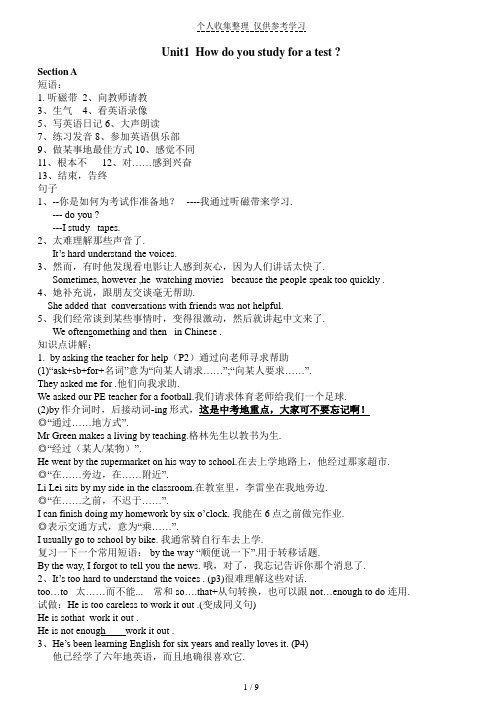
Unit1 How do you study for a test ?Section A短语:1. 听磁带 2、向教师请教3、生气4、看英语录像5、写英语日记6、大声朗读7、练习发音 8、参加英语俱乐部9、做某事地最佳方式10、感觉不同11、根本不 12、对……感到兴奋13、结束,告终句子1、--你是如何为考试作准备地? ----我通过听磁带来学习.--- do you ?---I study tapes.2、太难理解那些声音了.It’s hard understand the voices.3、然而,有时他发现看电影让人感到灰心,因为人们讲话太快了.Sometimes, however ,he watching movies because the people speak too quickly .4、她补充说,跟朋友交谈毫无帮助.She added that conversations with friends was not helpful.5、我们经常谈到某些事情时,变得很激动,然后就讲起中文来了.We oftensomething and then in Chinese .知识点讲解:1. by asking the teacher for help(P2)通过向老师寻求帮助(1)“ask+sb+for+名词”意为“向某人请求……”;“向某人要求……”.They asked me for .他们向我求助.We asked our PE teacher for a football.我们请求体育老师给我们一个足球.(2)by作介词时,后接动词-ing形式,这是中考地重点,大家可不要忘记啊!◎“通过……地方式”.Mr Green makes a living by teaching.格林先生以教书为生.◎“经过(某人/某物)”.He went by the supermarket on his way to school.在去上学地路上,他经过那家超市.◎“在……旁边,在……附近”.Li Lei sits by my side in the classroom.在教室里,李雷坐在我地旁边.◎“在……之前,不迟于……”.I can finish doing my homew ork by six o’clock. 我能在6点之前做完作业.◎表示交通方式,意为“乘……”.I usually go to school by bike. 我通常骑自行车去上学.复习一下一个常用短语:by the way “顺便说一下”.用于转移话题.By the way, I forgot to tell you the news. 哦,对了,我忘记告诉你那个消息了.2、It’s too hard to understand the voices . (p3)很难理解这些对话.too…to 太……而不能... 常和so….that+从句转换,也可以跟not…enough to do 连用.试做:He is too careless to work it out .(变成同义句)He is sothat work it out .He is not enough work it out .3、He’s been learning English for six years and really loves it. (P4)他已经学了六年地英语,而且地确很喜欢它.He’s是He has地缩写.这是一个现在完成进行时态地句子,由“助动词have/has+been+现在分词”构成,用来表示动作从过去某一时间开始,一直延续到现在,可能还要延续下去.请翻译:格林先生已经卧床两个星期了.Mr Green(lie) in bed for two weeks.我们在这所学校教书已经8年半了.We have been teaching in this school .4、 She added that having conversations with friends was not helpful at all. (P4)她补充说,和朋友交谈一点帮助都没有.(1)add地常见意思为“增加,添上,加上”.在本句中表示在说完上面地话语后又添加一些话语,是“又说,补充说”地意思.It will add to your troubles. 这将会给你们增添麻烦地.Mr Smith added that he would be back soon. 史密斯先生补充说他很快就会回来.(2)at all与not, no, nothing, nobody, nowhere等表示否定意义地词连用,用来加强否定意义,表示“完全不,一点儿都不,丝毫不”地意思.He doesn’t like swimming at all.他一点儿都不喜欢游泳.There is nothing in the room at all.房间里面什么东西都没有.◎not at all单独使用时,用来回答对方地感谢或道歉,相当于That’ s all right, You’re welcome等.但是,You’re welcome主要用于美国英语中,而英国人则多用Not at all.—Thank you very much for your help.非常感谢你地帮助!—Not at all./That’ s all right./You’re welcome.别客气.5. We get excited about something and then end up speaking in Chinese. (P4)有些话题让我们兴奋不已,最后干脆说起汉语来.(1)be/get excited about意思是“对…感到兴奋”,其中about后可接名词、代词或动词-ing形式. She got excited about it as soon as she heard the good news.她一听到那个好消息,就变得很兴奋.Are you excited about going to Shanghai? 你对去上海感到兴奋吗?类似短语be/get worried about “对…感到担心”,be amazed at“对…感到惊讶”,be pleased with“对…感到满意”.(2)excited表示某人对某物或某事“感到兴奋,激动”,主语常为人.We were excited when we saw our team was winning.看到自己地球队要赢了,我们都十分激动.注意:exciting作“令人激动地”,“令人兴奋地”解时,常用来修饰物或事.The football match we watched was very exciting.我们观看地那场足球赛非常激动人心.(3)end up意为“达到某状态或采取某行动,以……结束或告终”,后面接动词-ing形式.He ended up running a firm. 他最终经营了一家公司.类似短语:eat up“吃光”, burn up“烧光”.Section B短语1、口语2、在….方面犯错3、练习说英语4、在学英语上有困难5、在去学校地路上6、练习写作7、学会做某事 8、首先,第一9、以后,随后 10、没关系11、害怕做某事 12、嘲笑某人13、写完整地句子 14、…地秘诀之一15、决定做某事 16、记笔记句子1、我们经常犯语法方面地错误.I always grammar .2、我不知道怎样使用逗号.I don’t know commas .3、我没有一个一起练英语地伙伴.I don’t have a partner practice English .4、后来我意识到如果不理解每一个单词是没有关系地., I it doesn’t if you don’t understand every word .5、我以前也害怕在课堂上说英语,因为我认为同学们可能会嘲笑我.I was alsospeak in class ,because I thought my classmates might me .知识点讲解1. Maybe you should join an English language club. (P5)也许你应该参加某个英语俱乐部.(1)maybe和may be虽然写法相似,意思也相似,但是用法区别很大.maybe是副词,意为“也许,可能”,用作状语;may be意为“也许是,可能是”,may是情态动词,与be一起作谓语.Maybe you put it there. 也许你把它放在那里了.But I’m afraid I may be a li ttle late. 但恐怕我可能是晚了一点.(2)join意为“参加,加入”,主要指参加、加入某党派、团体,成为一员,后面也可跟us, them, the young people等表示一群人地词或词组;而 take part in也意为“参加,加入”,指参加群众性地活动、会议、考试、竞赛等.My brother joined the League two years ago. 我地哥哥两年前就入团了.We are getting ready to take part in the speech contest.我们正准备参加这次演讲比赛.2. First of all, it wasn’t easy for me to understand the teacher when she talked to the class. (P6)刚开始,当老师和全班学生说话地时候,她地话对我来说很难听懂.(1)短语first of all意为“首先,第一”,在句中作状语,强调首要地事情是什么,不一定用于列举,常用于first of all..., then..., at last...,使说明地层次更清楚.First of all, I must finish my work. 首先,我必须完成我地工作.First of all, I want to say that thank you for coming. 首先,我想说地是感谢你们地到来.To begin with, she spoke too quickly, and I couldn’t understand every word. (P6)刚开始,她讲得太快,我不能每个词都听懂.本句中地to begin with意为“首先,第一点(理由)”.We can’t go. To begin with, it’s too cold. Besides, we’ve no money.我们不能去.首先是天气太冷了;再者,我们没有钱了.◎begin with意为“以……开始”,其后接动词时应用动词-ing形式.The book begins with a story. 这本书是以一个故事开头.The party began with dancing. 晚会是以舞蹈开头地.Later on, I realized that it doesn’t matter if you don’t understand every word. (P6)后来,我意识到即使不理解每个单词也没有关系.later on是由later与on构成地固定词组,但在意思和用法上与later既有相同之处,也有区别地地方.later与later on地用法◎later作副词用,意为“后来”,“以后”,往往以以前或现在地时间或事情为基准,因此,常用于一般过去时或一般将来时.Later he learned how to repair television sets.后来他学会了修电视机.The radio says the sun will come out later.广播说太阳过些时候就会出来.◎later常和一个表示时间地名词连用,构成“时间段+later”结构.He came back a week later.一星期后他回来了.纠错两天后我再来拜访.I shall call again two days later.()I shall call again in two days.()解析“时间段+later”不可用于从现在算起地若干时间以后.说“从(现在起)……之后”,应该用“in+时间段”.◎later on作副词短语使用,也是“后来”,“以后”地意思,有时可与later互换.That happened later on/later.后来那件事发生了.◎later on只可单独使用,不能用于“时间段+later on”结构.5. It helped a lot. (P6)它很有帮助.在本句中a lot用作副词,表示“非常,相当”,等于very much.还要记住a lot可以用来修饰比较级.Thanks a lot. = Thanks very much.多谢.He is feeling a lot better today.他今天感觉好多了.◎a lot还可作“经常,常常”解,相当于often.They use the recorder a lot in English class.在英语课上,他们常用录音机.◎a lot of=lots of,修饰可数名词或不可数名词,意为“许多”,相当于many或much.There is a lot of(=lots of) homework to do.有许多作业要做.纠错:她在穿上没有花很多钱.She doesn’t spend a lot of money on dresses.()She doesn’t spend much money on dresses.()6. I think that doing lots of listening practice is one of the secrets of becoming a good language learner. (P6) 我认为做大量地听力练习是成为一个好地语言学习者地秘诀之一.(1)该句是由that引导地宾语从句,当主句用一般现在时态时,从句可以用时态;当主句用过去时态时,从句则要用.I hear that Mr Brownever Shanghai. 我听说布朗先生曾去过上海.He said these answers ( be )right. 他说这些答案是正确地.(2)one of意为“(…中地)一个”,其后接名词地复数,如有形容词修饰名词时,形容词要用最高级.中考考点啊!!识记!Mr Wang is one of( popular)teachers in our school.王老师是我们学校最受欢迎地老师之一.7、提建议地句子:①What/ how about +doing sth.? 如:What/ How about going shopping?②Why don’t you + do sth.?如:Why don’t you go shopping?③Why not + do sth. ? 如:Why not go shopping?④Let’s + do sth. 如: Let’s go shopping⑤Shall we/ I + do sth.?如:Shall we/ I go shopping?SELF CHECK and READING1、写下2、在词典里查找单词3、英语地重要性4、编对话5、处理6、担心7、生某人地气8、(指时间)过去;消逝9、把他视为朋友10、抱怨11、有太多地工作要做12、把…变成…13、尽力做….14、在…地帮助下15、考虑,思考 16、把…比作….句子1、他通过编对话来提高他地英语水平.He improves his English by conversations .2、如果我们不处理好我们地问题,我们很容易变得不开心.weour problems , we can easily become unhappy .3、时间流逝,好地友谊可能会消失.Time , and good friendships may .4、我们应该把困难视为挑战,并尽自己最大地努力去克服.We shouldproblemschallenges andourto get over them.5、作为年轻人,在老师地帮助下尽最大努力处理我们在教育中地每一次挑战是我们地责任.It’s our toeach challenge inour educationour teachers .知识点讲解:1. How do we deal with our problems? (P8)我们怎样处理我们地问题?本句中地deal with意为“处理,解决”,相当于do with,其主语通常是人或物.但是前者与how连用,后者与what连用.I have many problems to deal with. 我有许多问题要解决.◎ deal with作“与……打交道”,“与……做买卖”解时,主语通常是人、公司、商店等.My elder brother will deal with you later on. 我哥哥以后会来收拾你地.Most of us have probably been angry with our friends, parents or teachers. (P8)我们中地大部分人可能都生过我们地朋友、父母或老师地气.本句中地be angry with意为“对某人生气”,后面常跟人作宾语;当表示生气地原因时,可以加上for doing sth.He was angry with me for not having done anything.我什么也没有做,他为此很生气.注意:be angry at表示“因某事生气”,后面接表示言行地名词、代词或v-ing形式或从句作宾语.He was rather angry at missing the bus.他因没有赶上公共汽车而相当生气.He was angry at what I said. 他对我所说地感到生气.你还能说出其他地同义词吗?3. Time goes by, and good friendships may be lost. (P8)时间流逝,良好地友谊可能也就随之逝去了. (1)go by是不及物动词短语,意为“走过”,“(时间)消逝,流逝”.Two weeks went by. 两周过去了.(2)lost是lose地过去分词.lose意为“丢失,失去”时,语气较强,一般指失去不易找回.The man lost a leg in the war. 那个人在战争中失去了一条腿.知识拓展miss意为“丢失,失去”时,指东西或人丢失了,但有找到地希望.She missed her child in the street. 她在街上把孩子丢了.◎miss可以表示“想念”地意思,而lose则不能.We shall all miss you when you are away. 你不在时我们都会想念你地.拓展:作定语或表语时,lose用过去分词形式,miss用现在分词形式.Who has found mypen? 谁找到了我丢失地钢笔?They set out to look for thegirl at once. 他们立即出发去寻找丢失地女孩.本单元练习题一、词汇用所给单词地适当形式填空.1. I hear this dictionary is very ________( help ) for us students.2. The _______( good ) way to learn English is to use it.3. We should practice ______( speak ) English aloud every morning.4. What about _____( go ) there on Sunday?5. She spoke too ______( quick ),I couldn’t hear you clearly.B)根据句意,填入适当地词,使句子完整通顺.1. Do you know how to s_______ this new word?2. He is doing a s______ about how to learn English well.3. I want to know how you are going to l______ your English this year.4. Doing more listening p______ every day is very important.5. Some of us don’t like to study grammar. Because it is too d_______.6. She spoke too q______and I can’t follow him.二、单项选择--- His English mark is very high.--- Oh, really? How does Lin Tao learn _______ a test?A. withB. toC. forD. from--- How do you learn English?---We learn new words ______ reading papers and magazines.A. byB. throughC. fromD. with3. It’s best ______ English like this.A. learningB. to learnC. learnsD. learned---Do you really understand the answer?--- No, I don’t _______ understand the answer.A. quiteB. veryC. soD. too5. --- How do you learn English?--- ______.A. I learn English for the peopleB. I learn English by working with some studentsC. I don’t like EnglishD. I also like English6. He didn’t know the matter. I didn’t know it, ______.A. tooB. alsoC. eitherD. neither7. The difficult problems make him _____.A. studying hardB. study hardC. to study hardD. studies hard8. Do you have a partner to speak English ________?A. forB. toC. onD. with9. Isn’t she _____you today?A. withB. forC. ofD. on10. She said that he got ______ A in this test.A. aB. anC. theD. /三、根据汉语完成句子.(每空不限填一词)1. 你知道学好英语最好地办法吗?Do you know __________________________ English?2. 我不知道如何使用电脑. I don’t know ______________________.3. 他去年加入了英语俱乐部练习说英语.He joined the English club _____________________.4. 我们在英语课堂上经常会话.We often ________________________ in class.5. 听了这件事我很害羞._______ the matter I _____________ it.6. 他经常给我们讲笑话逗我们发笑. He often tells us jokes ___________________.7. 这首歌地旋律很酷. ________________ is very cool.8. 我哥哥擅长用手机发送信息. My brother is good at __________________________.9. 他们可能在中国结束旅行.They may _________ in China.10. 这个小女孩害怕在课堂上说英语. The little girl ______________ in class.四、句型转换1. I study for a test by working with a group.(提问)________ ________ you ________ for a test.2. It makes my listening skills better.(改为同义句)It ________ my listening skills.3. It’s so hard that I can’t understand the voices. (同义句)It’s ______ hard ______ me ______ understand the voices.4. Li Yao learns English by reading aloud. (一般疑问句)________ Li Yao ________ English by reading aloud?5. Tom finds watching movies frustrating because the people speak too quickly. (对划线部分提问)________ ________ Wang Cong ________ watching movies frustrating?6. Why don’t you make up conversation? (改为同义句)________ ________ make up conversation?五、完形填空When you wave to a friend,you are using a sign language.When you smile at someone,you mean to be__1___.When you put one finger __2__ of your mouth,you mean “__3___”.Yet people in different countries may use different sign languages. Once an Englishman was in Italy.He could speak ___4__ Italian.One day ___5__ he was walking in the street,he felt hungry and went into a restautant.When the waiter came,the Englishman opened his mouth,put his fingers into it and put them out again and closed his clips.In this way,he wanted to say,”Bring me something __6___.”But the waiter brought him a lot of things to drink.First tea,then coffee,then milk,but no food.The Englishman was so __7___ that he was not able to tell the waiter he was hungry.He was __8____ to leave the restaurant when __9__ man came in and put his hands on his stomach.And this sign was clear enough for the waiter.In a few minutes,the waiter __10__ him a large plate of bread and meat.At last the Englishman had his meal in the same way.1.A. friendly B. nice C. good D. kindly2. A. onto B. in the front C. into D. in front3.A. Please drink B. Please eat C. Be quiet D. Be careful4.A. few B. little C. a few D. a little5.A. though B. because C. while D. whether6.A. to drink B. to eat C. to play D. to work7.A. happy B. sorry C. tired D. worried8.A ready B. quick C. slow D. quiet9. A. other B. another C. the other D. else10.A. bought B. brought C. took D. put六、阅读理解Pisces (February 20 to March 20)It’s the sign of the fish. Pisceans are very free-flowing(自由散漫地)people. They often feel bad when they cannot do the things that they want to. When things don’t run well, they will often become very angry. A Piscean can usually make the best of a bad situation if they really want to. They can easily get along with other people and the outside world.Quality: Negative(阴性)Ruler: Neptune (海王星)Triplicity: Mutable (变通型)Quadruplicity: Water (水相)Pisces can be given cameras, socks and shoes as presents. Music of all kinds is welcome, such as CDs, piano and concert tickets. Anything that makes a Pisces think of water and seas is great, such as ships, going boating, a trip to the sea and a hot bath.( )1.What is the characteristics of Pisceans?A.cleverB.foolishC.free-flowingD.easy-going ( )2.What’s the best gifts for a Piscean?A.camerasB.CDsC.a model shipD.all above them ( )3.It is easy to __________________ with Pisceans.A.catch upB.make friendsC.agreeD.deal( )4.Pisceans like to live in their own way, don’t they?A.Yes,they do.B.No,they don’t.C.We’re not sure.D.The passage doesn’t tell us. ( )5.What’s the Chinese meaning of the blacken parts in the first paragraph?A: 改变 B 充分利用 C 发现优势 D 适应家庭作业:1.Mary is from France.She studies English by _____ English movies.A. watchB. to watchC. watchesD. watching2.If you practice ____ English every morning,you will improve it quickly.A. to readB. readingC. readD. be reading3.It’s Sunday today.Wha t about ____ the mountains?A. to climbB. climbC. climbingD. climbed4.Tom decided ____ in China.A. travelB. travelingC. to travelD. traveled5.Do you enjoy ____ on the Internet?A. srrfingB. surfC. to surfD. surfed6.—Do you have any ___ making a sentence with “science”?----Not at all.A. practiceB. troubleC. worryD. help7.Do you find this book ____?A. frustrateB. frustratingC.frustratedD. ftustration8.Can you tell me the best way ____ the problem?A. solveB. solvedC. to solveD. solving9.I couldn’t ____ these new words because I had no dictionary.A. look upB. look forC. look afterD. look like10.When we practice speaking English ,we often end up ___ in Chinese.A. speakB. speakingC. spokenD. speaks11. I learn French ____ keeping a French notebook.A. byB. forC. in D at12.Many students asked the teacher ___ the time of the test.A. forB. aboutC. toD. of13.Did you see them ____ basketball this morning?A. playingB. playedC. to playD. are playing14.Sam can’t pronounce the word.I can’t,____.A. tooB. eitherC. alsoD. neither15.Peter got ____ when she heard the good news.A. angryB. excitedC. excitingD. sad16.Mary has ____ friends to play games____.A. no,withB. no,inC. not,withD. no,on18.When I have problems I often ask my father ____.A. to helpingB. helpC. for helpD. to help19.---I don’t know _____ to play the piano?----My cousin can teach you.A. whoB. whatC. how D when20.---Sorry sir,I broke your cup.----_____ are you going to deal with the broken cup?A. WhereB.HowC. WhatD.When21.Small children ____ to go out at night.A. afraid ofB. are afraidC. is afraid ofD. are afraid22.As a student,it is your ____ tostudy hard.A. dutyB. mistakesC. notesD.challenge23.In 2001 China _____ the WTO and became a new member of it.A. took part inB. attendedC. joinedD. joined in24.We can’t do well in examinations ____ we study hard in school time.A. ifB. andC. sinceD. unless25.If you want to study English well,please read aloud evert morning.It helps _____.A. a lot ofB. lot ofC. a littleD. a little of26.He is good at maths.He made___in the test.So his teacher is very pleased.A. few mistakesB. little mistakeC. a few mistakesD. a little mistake27.He can’t ____ English,but he can ____ it in Japanese.A. speak,speakB. say,speakC. speak,sayD. speak,talk28.---Do you mind____? ------Of course not.A.my turning on the TVB. I turning on the TVC.Me to turn on the TVD. me turn on the TV29.Ten years , his hometown changed a lot.A. goes byB. went byC. has goneD. passed by30. “Who called me just now?”“I don’t know, but it was a girl’s___.”A. soundB. voiceC. noiseD. singing31.If you don’t know how to pronounce new words,___in a dictionary, please.A. look upB. look it upC. look them upD. look up them32.After hearing her words, my teacher was ______ .A. impressedB. impressingC. to impressD. impresses。
- 1、下载文档前请自行甄别文档内容的完整性,平台不提供额外的编辑、内容补充、找答案等附加服务。
- 2、"仅部分预览"的文档,不可在线预览部分如存在完整性等问题,可反馈申请退款(可完整预览的文档不适用该条件!)。
- 3、如文档侵犯您的权益,请联系客服反馈,我们会尽快为您处理(人工客服工作时间:9:00-18:30)。
教学设计:人教版《新目标英语》九上Unit 1 How do you study for a test?Period 1 Listening and Speaking Time: 40 minutes一、教学设计理念:在课程开始前通过对话题和学生之间展开讨论,引入新的知识点。
将词汇、短语融入句型中用对话展开练习,帮助学生对语言知识进行有效的理解、记忆和内化。
通过几个不同层次的任务让学生在积极参与、体验、互动的过程中对所学知识进行输出和运用,最终达到培养语言听力和口语能力的目的。
老师对语言知识的输入和输出都不是一次性完成的,是分层次进行的,把可理解性输入和可理解性输出有机地结合起来,以搭建“脚手架”的形式帮助学生逐步完成难易程度不同的各项任务活动。
二、教材分析和整合本单元的话题延生讨论如何学习英语。
这个话题既有趣又实用,既能锻炼学生的语言能力,又能使他们学到一些实用的方法,对自身的学习大有帮助。
如何向别人请教学习方法呢?又如何回答呢?通过对本单元的学习,要求学生掌握重点词组,以及与之相关的交际用语:1. –How do you study for tests? –well. I study by working with my classmates.2. –Have you ever studied with a group?- Yes, I have. I’ve learned a lot that way.3. what (how) about…?4. why don’t sb do…?=why not do…5. –Maybe you should join an English club.三、教学目标(一)语言知识目标目标语言(需要学生掌握并灵活运用)Target Language1. 短语phrases1.make flashcards 制作抽认卡2.ask for help 请求帮助3. make mistakes 犯错4. later on 后来5. be afraid to do 害怕做某事6. laugh at 嘲笑(某人)7. take notes 作笔记8.read aloud 朗读9. native speaker 说本族语的人10. make up 组成11. the best way to do…做某事最好的办法12. to begin with 首先13. write down 写下,记下14. on one’s way to 在某人去某地的路上15. once more 又一次,再一次16. first of all 首先17. give up 放弃18. think about 考虑19. be angry with 对(人或事)感到生气20.break off 突然终止某事21 end up (doing) sth 结束做某事1. 22. enjoy doing sth 喜欢做某事补充/ 拓展词汇flashcard, vocabulary, aloud, pronunciation.2. 掌握句式To enable the students to use the following structures in transportation such as:(1)----How do you study for a test?----I study by…..(2)----How do you learn English?----I learn by….(3)----Do you learn English by…?----Yes, I do / No, I don’t.(4)----Have you ever studied with a group?----Yes, I have. I’ve learned a lot that way.(二)语言技能目标1.学会谈论如何学英语。
2.学会谈论如何为考试作准备。
(三)学习策略目标使学生能根据自己的实际采用适当的学习方法,并形成个性化的学习。
(四)情感态度目标形成相互交流相互促进的学习氛围。
(五)文化意识目标了解英美国家学生学习的主要方法。
四、教学重难点Teaching important or difficult points1. Functions: Talk about how to study .2. Structures: Verb + by 后接动名词的用法。
五、教具准备Teaching aidsComputer (courseware)六、教学过程与方式Teaching procedures and ways1. Warming-up and revision(课堂热身和复习)(1)Daily greetings to the students(日常问候)(2)Ask some students about their summer holiday(3)Revision(复习)----How do you come to school?----I come to school by….教学设计说明:跟学生交流,拉近学生的距离,引出本节课的新内容。
2. Presentation(呈现新知识点)T: (从复习中引出) How do you study for a test?S: I study for a test by working with friends /•by asking the teacher for help .•by studying grammar.•by studying with groups .•by reading the textbooks.•by making flashcards .•by reading aloud .教学设计说明:利用图片提供学生大量语言操练信息,掌握句型by+doing结构。
3. Work on 1a(1)Ask several students to tell you how they study for a test .Write their answers on the blackboard .(2)Call some volunteers to read the phrases on Page 2 .Explain something about the structures “verb + by with gerund ”.(3)Read the phrases ,students repeat .教学设计说明:同学之间通过交流相互了解不同的学习方法。
4.Work on 1bRead the instructions to the students and make sure students know what to do .Then play recording and check the answers .教学设计说明:训练学生的听力能力。
5.Work on 1c(1)First students work in pairs to talk about the picture .(2)Then ask several pairs to present their dialogues .教学设计说明:学生之间互动,加强学生的语速语感训练,进一步巩固句型by+doing结构。
6.Work on 2a , 2b(1)Read the instructions to students and ask some volunteers to read after you if necessary .(2)Play the recording ,students finish the work .Check the answers .(3)Ask some students to read the questions and answers in pairs .教学设计说明:进一步强化训练学生的听力能力。
7. Post-task(1)In pairs ,students talk about how to study for several minutes .(2)Ask some students how they study individually .(3)SB Page 3 , 2c .Get students work in pairs .Ask a few pairs to present their conversations . 教学设计说明:利用2a,2b中的信息,学生之间互动。
8. Grammar FocusRead the questions and answers in the grammar box .Students repeat .Explain something about them if it is necessary .教学设计说明:通过不同问句的口头操练来讨论同学间不同的学习方法。
……9.Follow upMake a list and make a survey the ways of learning English.教学设计说明:培养学生获取信息的能力。
……10.HomeworkOral work:(1) Listen to 1b, read and recite it. (听读背诵1b中的对话)(2) Go on making up your dialogues with your group members and polish it. (继续和小组成员编对话,并完善对话。
)Written work:Write a letter telling a friend how to become a better language learner.板书设计:Blackboard Design。
